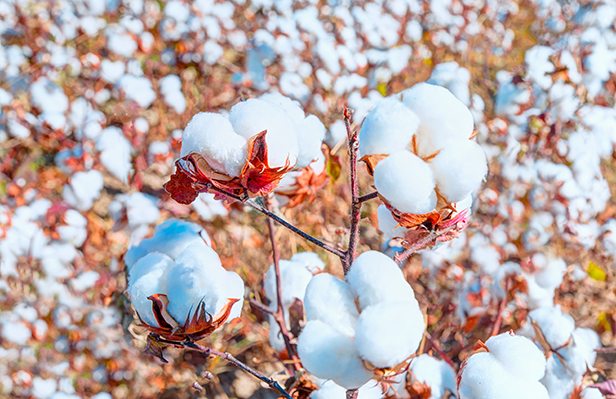Product Hub January 14, 2021
U.S. Ban on Xinjiang Cotton Takes Effect
Xinjiang is reported to produce 20% of the world’s cotton supply. The ban could impact supply chains – and potentially drive price increases and influence product preference – in promo and beyond.
A ban on all cotton products from China’s Xinjiang region went into effect in the United States on Wednesday, January 13, creating potential supply chain challenges for apparel and textile importers, fueling possible cotton price increases, and driving potential changes in product preferences in the promotional products industry and beyond.

U.S. Customs and Border Protection (CBP), an agency within the Department of Homeland Security (DHS), issued the ban, known as a Withhold Release Order (WRO), against cotton products and tomato products from Xinjiang. The agency did so because American authorities believe China makes extensive use of forced labor and detainee/prison labor in Xinjiang to produce such items.
The ban empowers border agents to detain items that include raw fibers, apparel and textiles made from cotton in Xinjiang. If a product is manufactured outside Xinjiang, but contains Xinjiang cotton, then it is subject to seizure by U.S. border agents.
.@CBP issued a Withhold Release Order against cotton products and tomato products produced in Xinjiang based on information that reasonably indicates the use of detainee or prison labor and situations of forced labor.
— CBP Mark Morgan (@CBPMarkMorgan) January 13, 2021
Read more here➡️https://t.co/XgSKdb7jxZ pic.twitter.com/dQbd1z9hpJ
“CBP will not tolerate the Chinese government’s exploitation of modern slavery to import goods into the United States below fair market value,” said CBP Acting Commissioner Mark A. Morgan. “Imports made on the cheap by using forced labor hurt American businesses that respect human rights and also expose unsuspecting consumers to unethical purchases.”
The U.S. imports about $9 billion worth cotton products annually, according DHS. Of course, not all of that comes from Xinjiang or China. Still, Xinjiang produces about 20% of the world’s cotton and 84% of China’s supply, according to some estimates. China is the world’s third-largest cotton-producing nation, behind India and the United States.
The 4th indicator of #ForcedLabor is Isolation. Victims are often isolated and denied contact with the outside world, without means of transportation from the site.
— CBP (@CBP) January 13, 2021
CBP ensures that US businesses don’t import goods made with Forced Labor. #EndTrafficking: https://t.co/cGqXcCjcIZ pic.twitter.com/zi5UrtEJ3M
According to U.S. authorities and various human rights investigators, China has forcibly detained people from the Uyghur ethnic group in Xinjiang and pressed them en masse into forced labor. Uyghurs are primarily of the Islamic faith, and the repression is reported to be tied to their religion, though Beijing denies any wrongdoing.
To combat the alleged oppression and compel change, the U.S. Congress in December approved the Uyghur Forced Labor Prevention Act. It assumes that all goods manufactured in Xinjiang are made with forced labor and therefore banned under the 1930 Tariff Act, unless the commissioner of CBP certifies otherwise.
CBP said it has identified the following forced labor indicators in Xinjiang: debt bondage, restriction of movement, isolation, intimidation and threats, withholding of wages, and abusive living and working conditions.
Apparel companies and organizations within and outside promo have commended efforts to combat forced labor in Xinjiang, with many saying they’ve taken proactive steps to cut any ties to Xinjiang cotton. Still, analysts have pointed out that supply chains can get murky, especially in China, and proving that items don’t have cotton from Xinjiang could be challenging.
When talk of a Xinjiang cotton ban intensified late last year, Eric Simsolo, director of business development at Gardena, CA-based Top 40 supplier Next Level Apparel (asi/73867), said that such a ban could trigger cotton price increases, which have already been on the rise. The ban, Simsolo said, could also propel a shift toward more synthetic fibers in apparel. Both of those developments would impact the promo products industry.
“The vendors that are smart about how they source and have the least impact on their COGS will be able to survive the price wars,” said Simsolo. A significant increase in cotton pricing would “directly affect cotton and cotton-blends. If prices go high enough, we could see the demand for and usage of synthetic fibers like polyester, nylon and modal go up.”
Apparel and textile importers that haven’t exited their supply chains from Xinjiang could find themselves facing considerable challenges, but a number of leading promo suppliers say they’ve been proactive about avoiding sourcing from the region for a while now.
“We’ve spent the past several years moving out of China due to the (import tariffs from the Trump administration), so many changes were already in motion,” Jeremy Lott, president/CEO of SanMar (asi/84863), the largest supplier in the North American promo industry, recently told Counselor. “As we became more aware of the issue of forced labor in Xinjiang, it only gave us more reason to seek other sourcing destinations.”
As news about forced labor in Xinjiang spread, Avenel, NJ-based Top 40 supplier Vantage Apparel (asi/93390) “immediately reviewed our supply chain mapping chart to reconfirm that no raw material supplies were coming in from that region,” Gina Barreca, Vantage’s director of marketing, has said. “We also reached out to our manufacturing partners and all of our factories have submitted an undertaking confirming there is no forced labor of any kind, especially from the Xinjiang region.”

Product Hub
Find the latest in quality products, must-know trends and fresh ideas for upcoming end-buyer campaigns.
